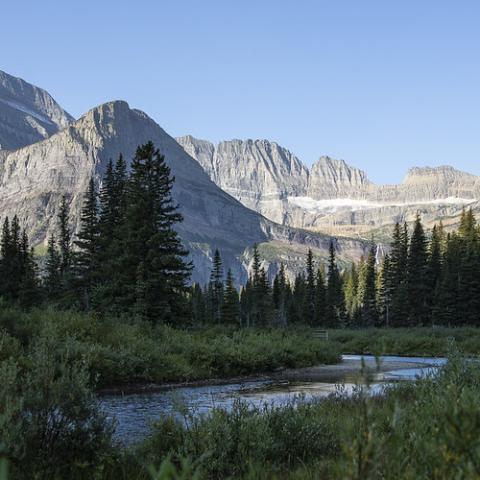With summer and visitors returning to the National Park System, expect some wildlife to pay the price. At Glacier National Park in Montana, a black bear that connected humans with food had to be put down because of its brazenness.
Rangers euthanized the bear Thursday in Apgar Village, a populated area of the park, after several reports in which the bear exhibited apparent food-conditioned behavior.
On Tuesday park staff say the same bear was "involved in an incident at Fish Creek Campground in which the bear grabbed food out of an open vehicle trunk at an occupied campsite while campers were eating at a picnic table a few feet away. The bear consumed the food and left the area."
Early Thursday, there were several sightings of the bear in Apgar Village and he did not seem bothered by human presence, according to witnesses. Rangers were called to the scene and the bear was determined to be a food-conditioned bear, and a threat to human safety.
The bear had an orange ear tag from Montana Fish, Wildlife and Parks identifying it as having been captured before. According to MFWP records, the bear was captured at Stanton Lake Lodge on June 5, 2015, for getting into garbage. The bear was two-and-a-half years old at the time and was relocated to Big Creek, 26 air miles away. There were no further incidents with this bear until this week’s incidents in Glacier National Park.
The bear weighed approximately 100 pounds.
Food-conditioned bears are those that have sought and obtained non-natural foods, destroyed property or displayed aggressive, non-defensive behavior towards humans and are removed from the wild. Food-conditioned bears are not relocated due to human safety concerns.
Black bears are not good candidates for animal capture facilities such as zoos and animal parks due to the plentiful nature of the species throughout the United States.
Glacier visitors are reminded to keep campgrounds and developed areas clean and free of food and trash. Regulations require that all edibles, food containers, and cookware be stored in a hard-sided vehicle or food locker when not in use, day or night. Place all trash in bear-proof containers. Do not burn waste in fire rings or leave litter around your camp. Fire rings should be free of trash before vacating a campsite.
If you see a bear along the road, you should not stop. Stopping and watching roadside bears will likely start a "bear jam" as other motorists follow your lead. "Bear jams" are hazardous to both people and bears as visibility is reduced and bears may feel threatened by the congestion, the park said. Report all bear sightings to the nearest ranger.
Visitors to Glacier National Park are reminded that the park is home to black and grizzly bears. Hikers are highly encouraged to hike in groups, make noise when hiking, and have bear spray accessible and know how to use it. For more information about recreating in bear country, please visit this site.




 Support Essential Coverage of Essential Places
Support Essential Coverage of Essential Places







Add comment